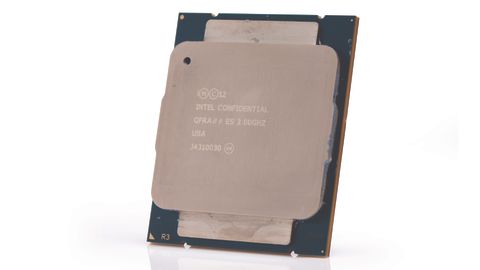Why you can trust TechRadar
As a platform then, the new Haswell E setup can become the base for a desktop machine with more power in it than ever before possible. And that's borne out by the benchmarks we've thrown at our test system this month.
Running the Core i7-5960X against the previous Ivy Bridge-E champion-chip, the Core i7-4960X, we're seeing at least a 25 per cent boost in multi-threaded applications.
We've never seen the X264 benchmark completed so quickly: we used to have time to go off and make a cup of tea while waiting for it to finish...
Compared with the latest Devil's Canyon i7-4790K we're looking at a performance uplift of well over 50 per cent. Of course you'd kind of hope for some extra performance considering the extra core count, but as the 5960X is also running almost a full 1GHz slower that's still pretty impressive stuff.
And when you start to level up the clockspeeds, with a little judicious waving of the overclock stick, the new Haswell-E chip really pulls away from either of the older processors.
With all three CPUs running at their maximum overclock there's a much bigger difference between their relative performance.
Using the Cinebench rendering benchmark, the Core i7-4960X is now 38 per cent slower than the top Core i7 Haswell-E and even running at a breakneck 4.7GHz the Core i7-4790K is a staggering 85 per cent slower than the new king.
So what did we manage to hit with our i7 5960X, then?
It took a little work, but we were able to get a rock-solid system running with the Asus X99 Deluxe motherboard at 4.375GHz. Try as we might though, we couldn't get it stable at anything higher.
But we're not professional overclockers, not by any stretch of the imagination, and we're confident you'll be able to find some 5960Xs going quicker in the wild.
One of the really impressive things outside of the raw performance of the Haswell-E is the fact that it manages to do it all within such a comfortable power and thermal envelope.
At stock speeds – thanks to that lowish baseclock – the i7-5960X runs almost 20°C cooler than the top Ivy Bridge-E CPU with both at 100 per cent load. It also operates with a peak platform power draw some 30 watts lower than the 4960X.
That levels off when you start overclocking, where the Haswell-E starts to get a bit more power hungry at peak performance, but impressively it still manages to run cooler than the 4960X when both are at their maximum frequency.
Gaming beast?
For a productivity machine, then, chewing through raw image and video files or doing any other form of brutal number-crunching, the Core i7-5960X is the pinnacle of desktop processors. It may be super-expensive, but the time it could save you rendering scenes and such might just prove worthwhile.
But as the best setup for gaming?
That's a tougher ask. Intel's supporting materials talk about performance boosts from the extra multi-threading capabilities of the Haswell E octocore, but when it comes to firing our game testing suite across its bows we've barely noticed any improvements over the standard Haswell platform.
That wasn't necessarily a big surprise when it comes to the Unreal Engine 3 likes of BioShock, but we were hoping for a bit of multi-threaded lovin' from Battlefield 4's Frostbite 3 engine.
The Core i7-5960X does have a slight edge when you start to throw multiple GPUs into the mix, but certainly not enough of an edge to make a hardened gamer suddenly think the extra £500-600 was worthwhile for a new CPU.
Benchmarks
CPU rendering performance
Cinebench R15 - Index score: higher is better
Core i7-5960X - 1387
Core i7-4960X - 1079
Core i7-4960K - 880
CPU video encoding performance
X264 v4.0 - Avg FPS: higher is better
Core i7-5960X - 81.82
Core i7-4960X - 65.19
Core i7-4960K - 53.28
Peak overclocking performance
Cinebench R15 - Index score: higher is better
Core i7-5960X - 1719
Core i7-4960X - 1238
Core i7-4960K - 927
Peak platform power
100% CPU load - Watts: lower is better
Core i7-5960X - 219
Core i7-4960X - 252
Core i7-4960K - 195
DirectX 11 1080p gaming performance
Battlefield 4 - (Min) Avg FPS: higher is better
Core i7-5960X - (58) 93
Core i7-4960X - (83) 104
Core i7-4960K - (59) 94
DirectX 11 1080p gaming performance
Metro: Last Light - (Min) Avg FPS: higher is better
Core i7-5960X - (19) 52
Core i7-4960X - (18) 52
Core i7-4960K - (11) 52
The only really surprising result is the single-threading performance of the stock-clocked i7 5960X.
Running with only one core, the CPU frequency bounces around like a freebasing kangaroo, though turning off Speed Step in the BIOS results in performance at the same level as an Ivy Bridge-E.
Obviously it's the octo-core's multi-threading performance that really steals the show though, especially in its overclocked state, running just shy of 4.4GHz.

